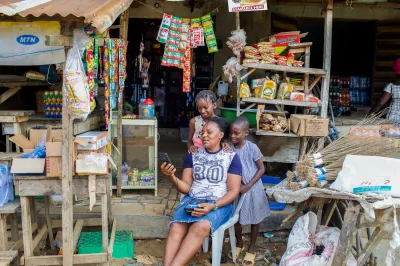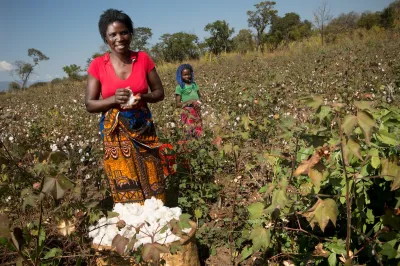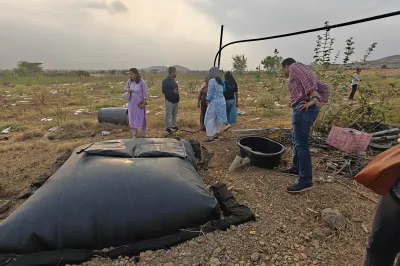5 Challenges for Women’s Financial Inclusion
How big is the challenge of financial inclusion for women? Nearly one of every three women in the world — or 1.1 billion — is excluded from the formal financial system. Globally, women are 7 percent less likely than men to have basic transactional accounts, and this disparity rises among the poor. Women living below $2 a day are 28 percent less likely than men to have a bank account. Often, these women have to store their money in cash and rely on personal networks or loan sharks to meet their most basic financial needs. This makes them vulnerable to loss, theft and exploitation, and reinforces the cycle of poverty.

The global scale of women’s financial exclusion makes it clear that to achieve universal financial access, we need to focus on women. But this is not an easy task. Expanding access to finance for women brings some unique challenges that funders and development practitioners should be thinking about as we push toward universal inclusion.
Excluded women are harder to identify. Household surveys are expensive and time consuming, but they are the only mechanism for identifying people who are outside the banking system. Banks can survey their clients and study their transactions, but this limits them to people who already have financial access. Women are informationally disadvantaged with smaller and less diverse networks, and are less likely to receive referrals from people within their networks.
Women are more difficult to reach through the usual channels that target men, including wage payments and remittance channels as well as savings accounts. In Eastern Europe and Central Asia, for example, only 18 percent of women report receiving wages into an account. Even with a scale up of digital wage payments, only 29 percent of women report having received wages in the past year, compared with 49 percent of men. In South Asia, men are twice as likely to have sent domestic remittances within the past year and 6 percent more likely to have received them. However, one channel in particular shows promise. Findex data show that men and women have similar rates of receipt of government-to-person transfers.
Providers have less incentive to cater to women because the margins are smaller and women require more upfront investment to bring on as customers. How do you lower transaction costs for someone who deals in small sums? Women often prefer informal products, particularly for savings, and reaching them with formal products entails higher costs in order to explain products to them and influence husbands, friends, and other community leaders who women turn to for advice and affirmation. Banks that successfully lent to women owned SME’s often also provide non-financial services such as leadership training.
Social norms constrain women’s demand for financial services. Often times women are not expected or encouraged to have financial independence. Sometimes they have mobility constraints that make it difficult to engage with financial institutions. Women, Business and the Law counts 17 economies where husbands can constrain their wives’ mobility outside the home. In worst case scenarios, women act merely as a transfer mechanism for financial products to men, further distorting the nature of demand. A study by Natalia Rigol of Harvard University showed that women entrepreneurs often diverted funds meant for their own businesses to businesses run by the men in their households.
Women have less access to technology, and with mobile phones being touted as the latest game changer that could radicalize rates of financial inclusion, the gender gap risks increasing if women are not specifically targeted. The GSMA estimates that 200 million fewer women than men own a mobile phone across low and middle income countries. In India, where the government is intensifying efforts to promote digital finance, a woman is 36 percent less likely to own a mobile phone than a man.
The importance of women’s access to finance goes beyond financial inclusion. Cuberes and Teignier estimate that in the Middle East and North Africa, the average income loss due to gender gaps in entrepreneurship and employment is 38 percent. Income losses in South Asia are estimated at 25 percent and at 17.3 percent in Latin America and the Caribbean. As an enabler of education, employment and entrepreneurship, financial inclusion underpins statistics on issues such as income.
A community of practice facilitated by CGAP was recently launched to bring practitioners, thought leaders, and policy makers together to share successful programs that can be replicated and scaled, and to identify common stumbling blocks that the community can come together to solve. A request for proposals was also released for the women’s financial inclusion track of the Women’s Economic Empowerment forum to be held in Bangkok in May.
The increased demand by the global development community to deliver results for women is grounded in the understanding that meaningful gains in poverty reduction and shared prosperity cannot be made without targeting this vast segment of society, and that the women’s market is a business opportunity that can underpin enhanced productivity and economic growth. But to be more inclusive of women, we must come together to address these challenges.




Comments
Dear CGAP,
Dear CGAP,
For sure financial inclusion is it is to be realized, financial institutions and other key players must be very gender sensitive. Some ladies will not benefit because of; culture, fear, torture, distance, lack of tech skills, scare, lack of access to technology as well. Players be clear and sensitive as well. Ntoni Timbyetaho, CEO Financial Planning Campaign, East Africa.
Dear CGAP,
Dear CGAP,
Another fundamental issue is the use of latest technology- SMART PHONE. This is not yet viral. its not yet in most of deep villages out there. Again there is a need to have 100% support to make technology friendly. Having it is different form using it. Its at that level which creates risk and fraud and manipulation. There is a need to have focal women in technology. Who will be consulted at all times- first buy in influencers in every community Ntoni Timbyetaho, CEO Financial Planning Campaign East Africa.
Add new comment